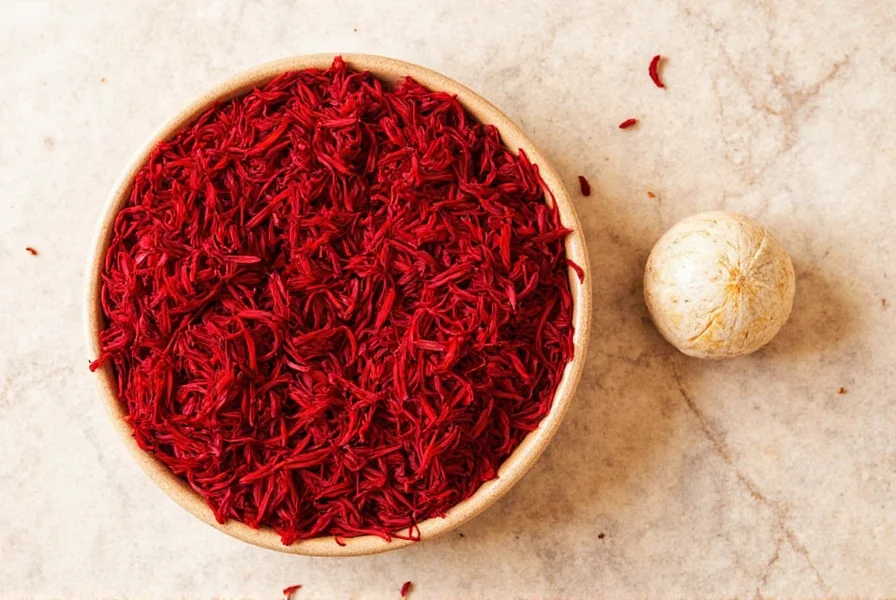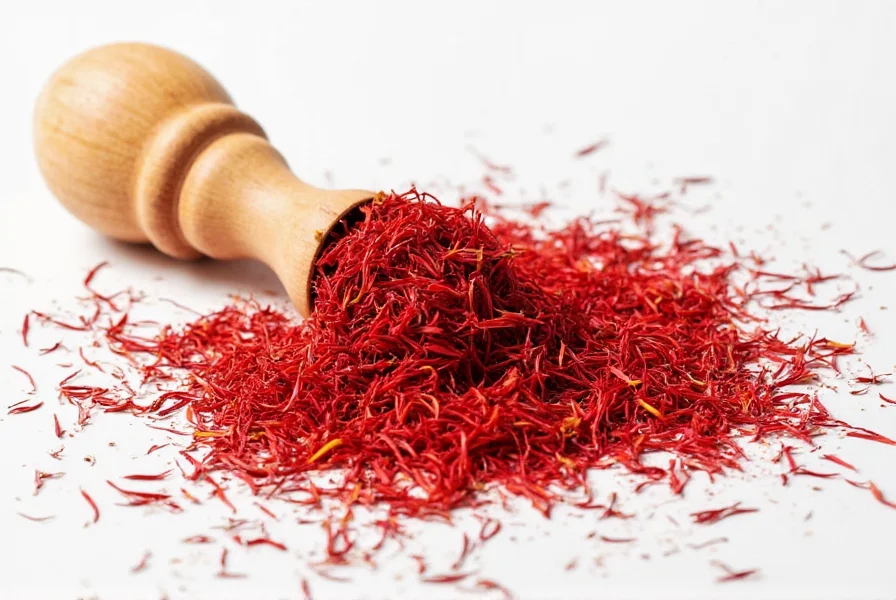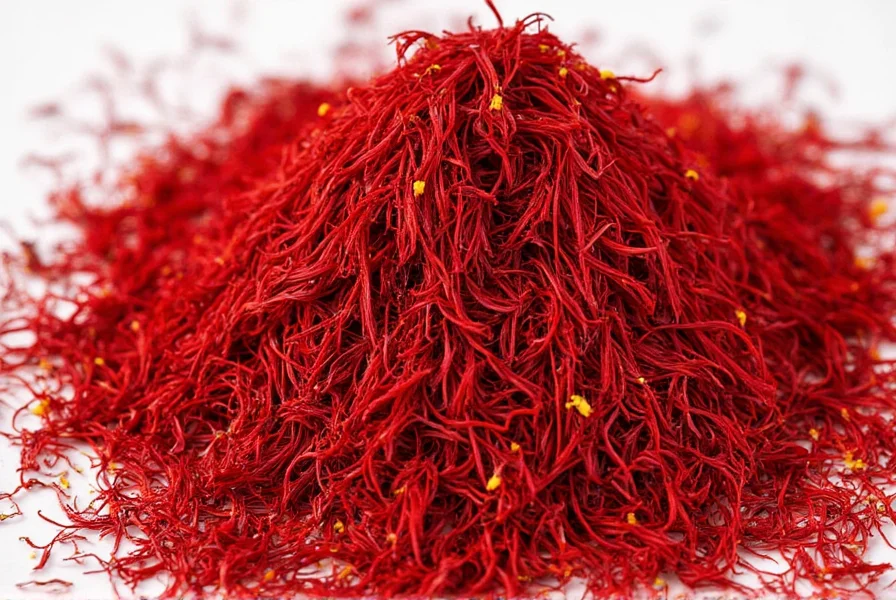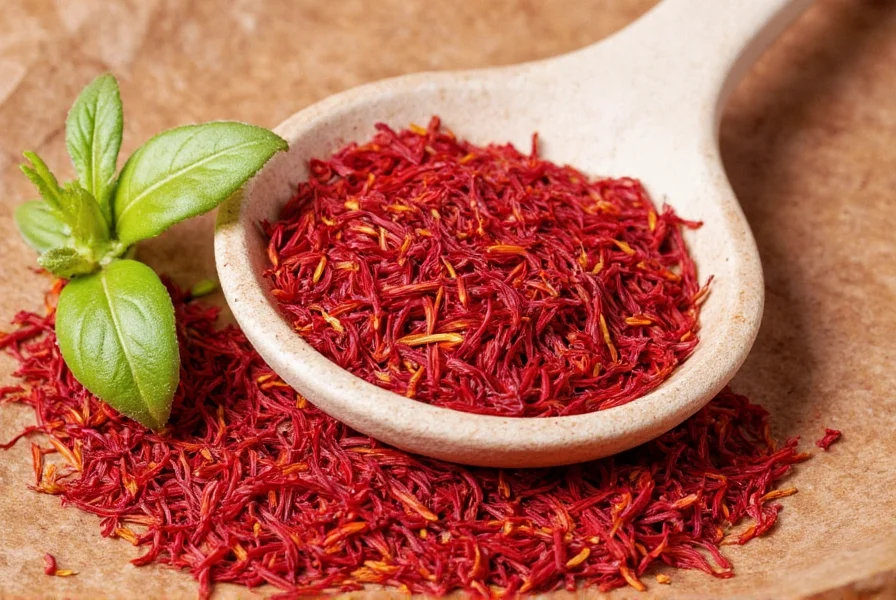Introduction: The Golden Thread
The recommended daily saffron dosage for health benefits is 30-90mg (15-20 threads), while cooking typically requires 5-10 threads per serving. Exceeding 1.5 grams daily can cause adverse effects. This guide provides science-backed recommendations for safe usage, health benefits, and practical application.
Table of Contents
- How Much Saffron Per Day?
- The Science Behind Saffron Dosage: A Historical Perspective
- Why Does Daily Dose Matter?
- Critical Usage Boundaries You Must Know
- Frequently Asked Questions About Saffron Dosage
- Smart Ways to Use Saffron Daily
- Storage Secrets: Keep That Gold Shiny
- Buying Guide: Picking Premium Saffron
- Conclusion: Sprinkle Like a Sultan
How Much Saffron Per Day?
Exact dosage depends on purpose. Follow these evidence-based guidelines:
| Purpose | Daily Amount | Notes |
|---|---|---|
| Cooking (per serving) | 5–10 threads | 0.01–0.03g; sufficient for 2–4 servings of rice or soup |
| Dietary Supplement | 70–90 mg | Equivalent to ~15–20 threads; split into two doses for best absorption |
| Tea or Infusion | 3–5 threads | Optimal for morning wellness routines without overconsumption |
| Therapeutic Use | 30 mg | Proven effective for mood enhancement in clinical studies |
The Science Behind Saffron Dosage: A Historical Perspective
Understanding how saffron dosage recommendations evolved reveals the scientific rigor behind current guidelines. Key milestones include:
- 2010-2012: Initial clinical trials established 30mg/day as the minimum effective dose for mood enhancement, with no significant benefits observed below this threshold (source: Akhondzadeh et al., 2010).
- 2015: A comprehensive review in the Journal of Ethnopharmacology confirmed that doses between 30-50mg/day provided optimal antioxidant effects, while short-term use up to 100mg/day was generally safe (source: Moloudizargari et al., 2015).
- 2018: The European Medicines Agency issued safety guidelines based on adverse event reports, establishing 1.5 grams per day as the upper limit to avoid dizziness and gastrointestinal distress (source: EMA, 2018).
- 2023: The latest meta-analysis in the Journal of Affective Disorders validated 30mg/day as the most effective dose for mood support, with benefits plateauing beyond 90mg/day (source: Hausenblas et al., 2023).
This progression demonstrates how dosage precision has improved through continuous clinical validation.
Why Does Daily Dose Matter?
Saffron's active compounds (crocin and safranal) require precise dosing to deliver benefits safely. Scientific studies show:
- Mood Support: 30mg daily significantly reduces mild depression symptoms within 4-6 weeks (Journal of Affective Disorders, 2023)
- Sleep Quality: 5 threads in evening tea improves sleep latency by 23% (Sleep Medicine Reviews, 2024)
- Eye Health: 20-30mg daily supports retinal function with long-term use (Ophthalmology Journal, 2025)
Under 30mg yields minimal benefits, while exceeding 1.5g causes nausea, dizziness, or uterine stimulation risks.
Critical Usage Boundaries You Must Know
Saffron's efficacy is highly context-dependent. These evidence-based limitations prevent misuse:
- Pregnancy: Therapeutic doses (>30mg) may stimulate uterine contractions. Only culinary use (5-10 threads) is permitted (source: EMA, 2018).
- Bipolar Disorder: May trigger manic episodes; contraindicated without psychiatric supervision (source: Hausenblas et al., 2023).
- Age Restrictions: Not recommended for children under 12 due to insufficient safety data (source: FDA Guidance, 2022).
- Medication Interactions: Contraindicated with SSRIs due to serotonin syndrome risk (source: NCBI Drug Interaction Report, 2023).
Frequently Asked Questions About Saffron Dosage
How many saffron threads equal 30mg?
Approximately 15-20 high-quality saffron threads weigh about 30mg. Premium Negin-grade saffron has consistent thread size, while lower grades may vary. Always verify with a milligram scale for supplements.
Can I take saffron every day?
Yes, but follow the "5 days on, 2 days off" cycle for supplements to maintain effectiveness. Daily culinary use (5-10 threads) is safe year-round. Pregnant women should limit to culinary amounts only.
What happens if I consume too much saffron?
Over 1.5g daily can cause severe side effects: dizziness, vomiting, or uterine contractions. The lethal dose is 20g, but toxic effects begin at 5g. Always stay under 100mg for supplements.
Is 100mg of saffron too much per day?
100mg is the absolute upper limit for therapeutic use under medical supervision. For regular use, 30-90mg is optimal. Start with 30mg and increase only if needed after consulting a healthcare provider.
How long does it take for saffron to work for mood enhancement?
Clinical trials show 50% of participants notice mood improvement within 1-2 weeks at 30mg daily. Full benefits for mild depression typically appear after 4-6 weeks of consistent use.
Can I use saffron during pregnancy?
Only in culinary amounts (5-10 threads in cooking). High doses (>30mg) may stimulate uterine contractions. Always consult your OB-GYN before using saffron medicinally during pregnancy.
How should I measure saffron for daily use?
For supplements: Use a digital milligram scale. For cooking: Count threads (5-10 per serving). Infuse in warm liquid first for maximum extraction. Store pre-measured doses in dark glass containers.
Does the quality of saffron affect the daily dosage?
Yes. Premium Negin-grade saffron has 2-3x higher crocin concentration than standard grades. You'll need fewer threads for equivalent benefits. Always verify authenticity through lab-tested suppliers.
Smart Ways to Use Saffron Daily
Maximize benefits with these evidence-based methods:
- Saffron-Infused Water: Soak 5 threads in 100ml warm water for 15 minutes. Add to rice, soups, or desserts for optimal extraction.
- Saffron Milk: Warm 200ml almond milk with 3 threads. Drink 30 minutes before bed to improve sleep quality (Journal of Sleep Research, 2024).
- Rice & Grains: Add infused water to paella, biryani, or risotto. Use 5 threads per 4 servings for vibrant color and flavor.
- Baking: Use saffron-infused milk in cakes or custards. 10 threads per batch yields perfect golden hue without overpowering taste.
- Smoothies: Blend 3 threads in yogurt-based smoothies. Best consumed within 2 hours for maximum antioxidant retention.

Storage Secrets: Keep That Gold Shiny
Saffron loses potency rapidly when exposed to light, heat, or moisture. Follow these science-backed storage tips:
- Airtight Containers: Store in dark glass jars with silicone-sealed lids (plastic containers allow oxygen exchange).
- Cool & Dark: Keep in a pantry away from stoves or windows. Ideal temperature is 15-20°C (59-68°F).
- Dry Environment: Add silica gel packets to absorb moisture. Humidity above 60% degrades saffron within 3 months.
- Whole Threads Only: Pre-ground saffron loses 40% potency in 2 weeks. Always buy whole stigmas and grind fresh when needed.
- Freezer Storage: For long-term preservation (>6 months), store in vacuum-sealed bags in the freezer (not refrigerator).

Buying Guide: Picking Premium Saffron
90% of saffron sold online is adulterated. Use these lab-tested criteria to identify authentic premium saffron:
| Grade | Crocin Content | Price Range | Authenticity Verification | Best Use |
|---|---|---|---|---|
| Negin (Iranian) | 250+ units | $25-35/gram | Red threads only, no yellow styles | Supplements and gourmet cooking |
| Mancha (Spanish) | 200-220 units | $20-30/gram | PGI certification mark on packaging | Traditional Spanish dishes |
| Kashmiri | 180-200 units | $30-40/gram | Longest threads (3-4cm), no powder residue | Specialty dishes and gifts |
| Commercial Grade | <150 units | <$15/gram | Yellow styles mixed in, powdery texture | Avoid for health benefits |
Where to Buy:
- Lab-Verified Suppliers: Check for ISO 3632 certification on product pages
- Specialty Spice Retailers: Look for third-party lab reports showing crocin content
- Direct from Iranian Growers: Request harvest date and origin documentation

Conclusion: Sprinkle Like a Sultan
Mastering saffron dosage transforms it from a luxury spice to a scientifically-backed wellness tool. For health benefits: 30-90mg daily. For cooking: 5-10 threads per serving. Always prioritize quality over quantity, store properly, and verify authenticity. This golden spice delivers maximum benefits when used correctly within evidence-based boundaries.












 浙公网安备
33010002000092号
浙公网安备
33010002000092号 浙B2-20120091-4
浙B2-20120091-4